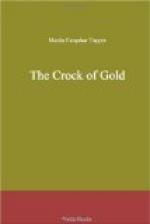We will leave thee in the cold stone cell—with thy well-named angel Grace to comfort thee, and pray with thee, and help thee back to God again, and so repay the debt that a daughter owes her father.
Happy prison! where the air is sweetened by the frankincense of piety, and the pavement gemmed with the flowers of hope, and the ceiling arched with Heaven’s bow of mercy, and the walls hung around with the dewy drapery of penitence!
Happy prison! where the talents that were lost are being found again, gathered in humility from this stone floor; where poor-making riches are banished from the postern, and rich-making poverty streameth in as light from the grated window; where care vexeth not now the labourer emptied of his gold, and calumny’s black tooth no longer gnaws the heart-strings of the innocent.
Hark! it is the turnkey, coming round to leave the pittance for the day: he is bringing in something in an earthern jar. Speak, Roger Acton, which will you choose, man—a prisoner’s mess of pottage—or a crock of gold?
CHAPTER XXII.
THE AUNT AND HER NEPHEW.
WHILE we leave Roger Acton in the jail, waiting for the very near assizes, and wearing every hour away in penitence and prayer, it will be needful to our story that we take a retrospective glance at certain events, of no slight importance.
I must now speak of things, of which there is no human witness; recording words, and deeds, whereof Heaven alone is cognizant, Heaven alone—and Hell! For there are secret matters, which the murdered cannot tell us, and the murderer dare not—let him confess as fully as he will. Therefore, with some omnipresent sense, some invisible ubiquity, I must note down scenes as they occurred, whether mortal eye has witnessed them or not; I must lay bare secret thoughts, unlatch the hidden chambers of the heart, and duly set out, as they successively arose, the idea which tongue had not embodied, the feeling which no action had expressed.
Hitherto, we have pretty well preserved inviolate the three grand unities—time, place, circumstance; and even now we do not sin against the first and chiefest, however we may seem so to sin; for, had it suited my purpose to have begun with the beginning, and to have placed the present revelations foremost, the strictest stickler for the unities would have only had to praise my orthodox adherence to them. As it is, I have chosen, for interest sake, to shuffle my cards a little; and two knaves happen to have turned up together just at this time and place. The time is just three weeks ago—a week before the baronet came of age, and a fortnight antecedent to the finding of the crock; which, as we know, after blessing Roger for a se’nnight, has at last left him in jail. The place is the cozy house-keepers room at Hurstley: and the brace of thorough knaves, to enact then and there as dramatis personae, includes Mistress Bridget Quarles, a fat, sturdy, bluffy, old woman, of a jolly laugh withal, and a noisy tongue—and our esteemed acquaintance Mister Simon Jennings. The aunt, house-keeper, had invited the nephew, butler, to take a dish of tea with her, and rum-punch had now succeeded the souchong.




